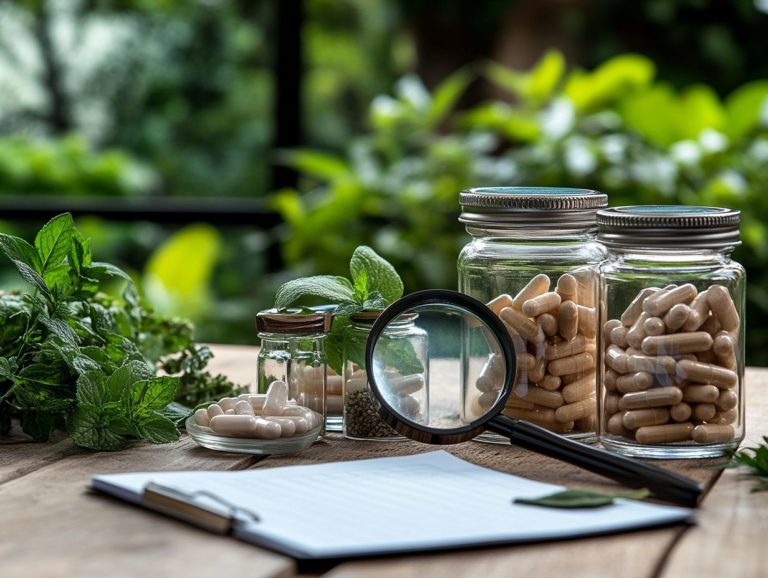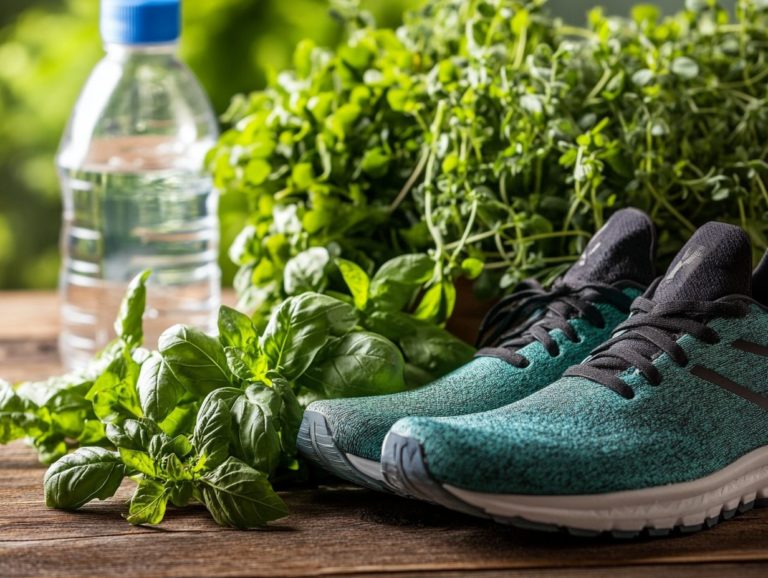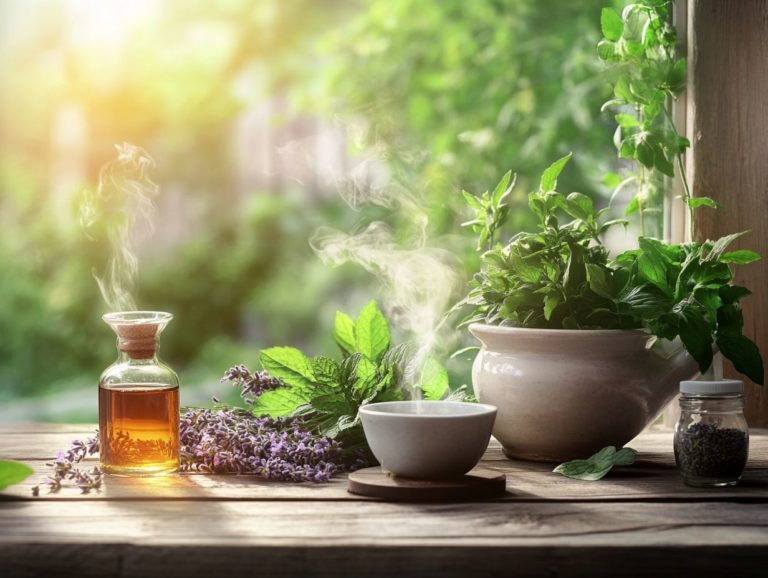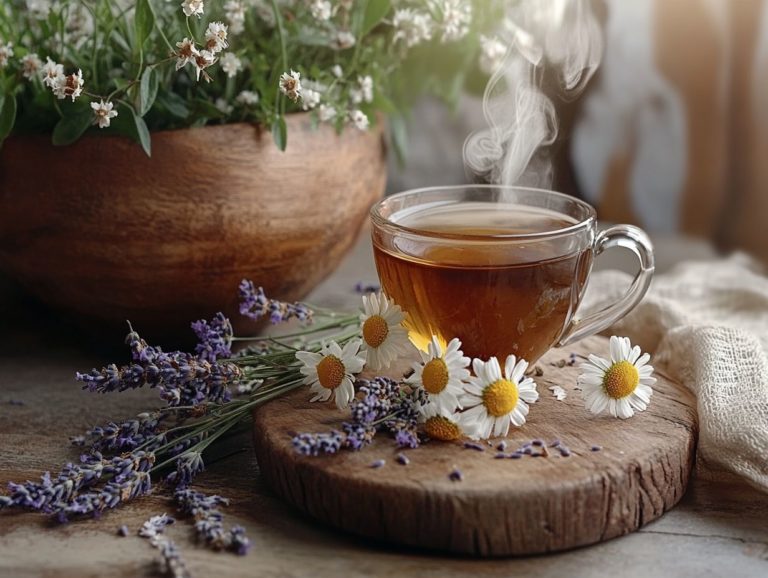Herbs to Relieve Stress and Anxiety
Stress and anxiety have woven themselves into daily life, making it crucial to explore natural remedies that can help restore your balance.
This article delves into the connection between herbs and mental health, showcasing effective herbs for relieving stress. You ll discover their benefits, learn how to add them to your routine, and understand the importance of being aware of potential side effects.
You will also learn about additional natural methods that can complement your stress management journey. Dive in to uncover how herbs can elevate your well-being!
Contents
Key Takeaways:
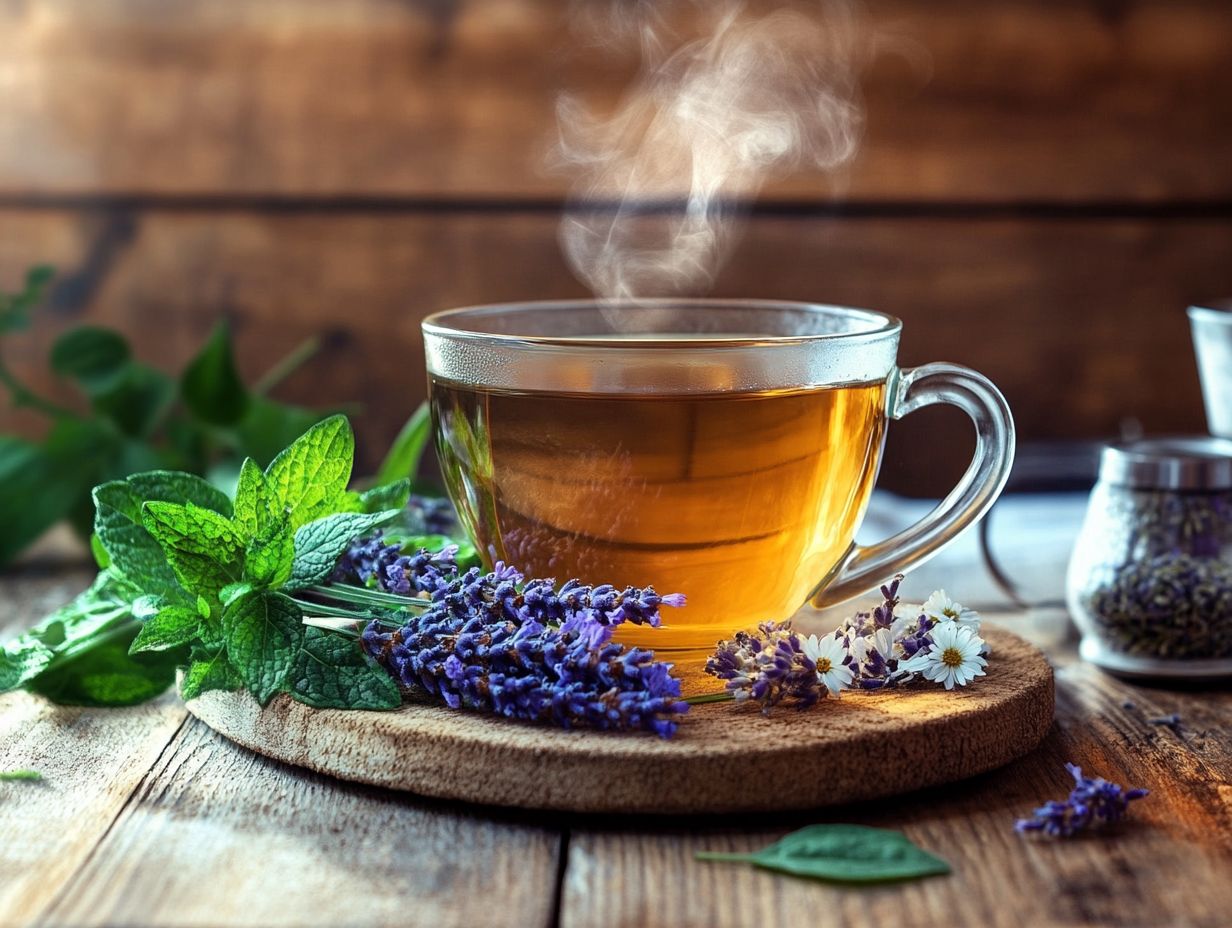
Adding herbs to your daily routine can provide natural relief from stress and anxiety. Some of the most effective herbs for stress relief include ashwagandha, chamomile, and lavender. Research proper dosage and potential interactions before using herbs, and explore complementary practices for added stress relief.
The Connection Between Herbs and Stress Relief
The link between herbs and stress relief is well-established in natural medicine traditions. Herbal remedies like chamomile, valerian, and ashwagandha have been cherished for centuries for easing anxiety and enhancing emotional well-being.
In today s fast-paced environment, adding these herbs to your daily routine is gaining traction as more individuals explore holistic therapies alongside traditional medical treatments for anxiety-related disorders, leading to better mental health outcomes.
Understanding the Role of Herbs in Mental Health
Herbs play a key role in enhancing mental health, offering natural remedies that provide emotional support and alleviate anxiety. These botanical allies are invaluable in both traditional and modern therapeutic practices.
Take passionflower, for instance; its calming properties can help ease restlessness and promote better sleep. Lavender is renowned for its stress-reducing abilities and mood-enhancing effects through aromatherapy.
Lemon balm is another gem, celebrated for its qualities that help your body cope with stress and restore balance.
By adding these herbs to your daily routine, you can quickly discover relief from chronic stress and emotional disturbances, fostering a sense of well-being that resonates with both psychological and physical health.
The natural compounds in these plants work together to support your nervous system, creating a nurturing environment for relaxation and emotional resilience.
Most Effective Herbs for Stress and Anxiety
In managing stress and anxiety, certain herbs are particularly effective.
Chamomile, valerian, and ashwagandha shine for their calming properties. These herbs promote relaxation and enhance sleep quality, providing a natural remedy to alleviate anxiety symptoms.
Benefits and Uses of Each Herb
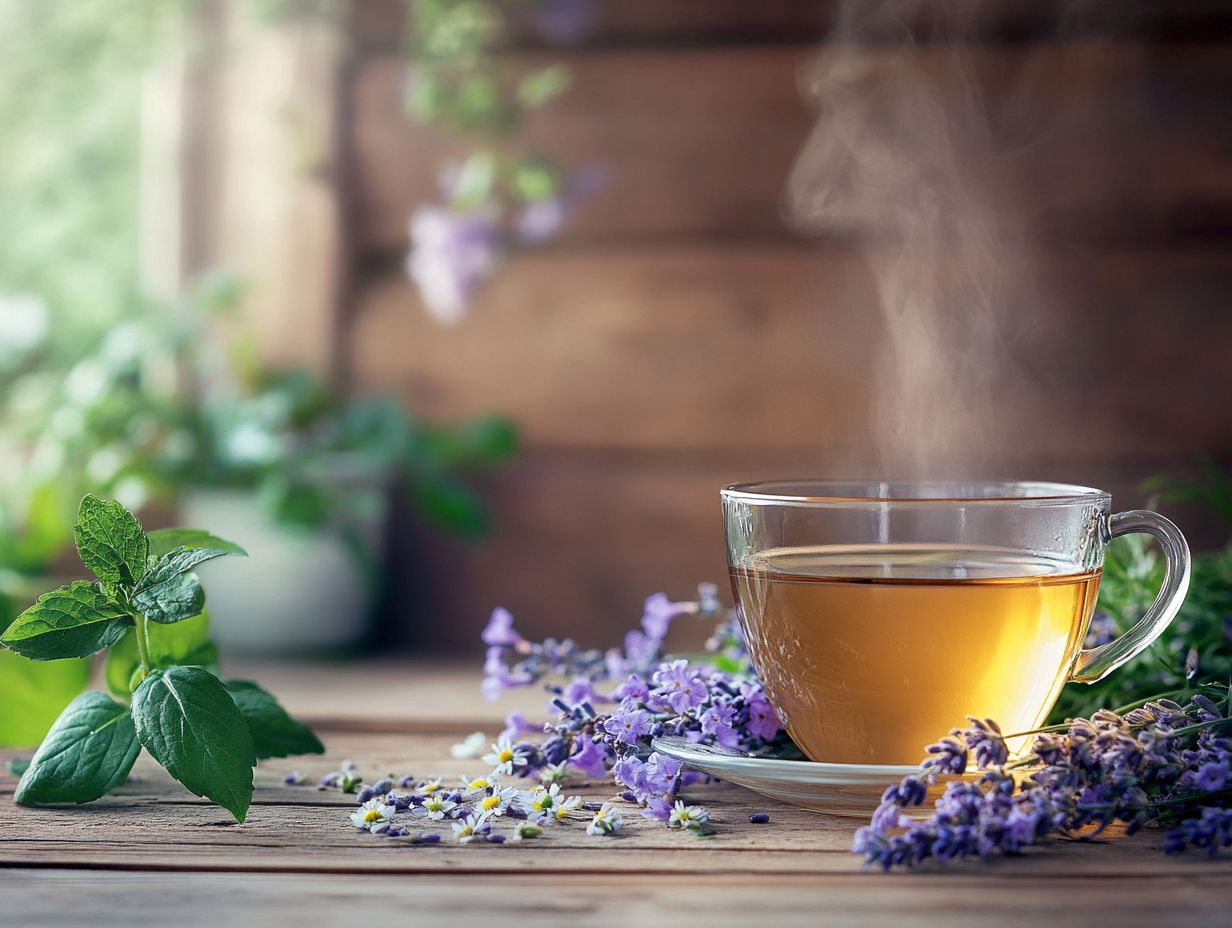
Each herb offers unique benefits. Chamomile is renowned for its anti-anxiety effects and ability to enhance sleep quality, while valerian root has a history as a calming agent that reduces nervous exhaustion.
Both herbs have been celebrated for their soothing properties, often woven into traditional remedies. Chamomile, typically enjoyed in tea, serves as a gentle relaxant and an ally against inflammation.
Many people have stories of how a warm cup of chamomile tea transformed a restless night into serene slumber. On the other hand, valerian root, taken as a tincture or capsule, is a go-to for those grappling with chronic stress or sleep disorders.
While these plants are generally safe, it s wise to use them with intention, as overconsumption may lead to side effects like drowsiness or digestive discomfort. Your experience may differ, underscoring the importance of personal research and consulting a healthcare professional when necessary.
Don t wait to start feeling better! Try adding these herbs to your routine today!
How to Incorporate Herbs into Your Routine
Incorporating herbs into your daily routine can transform your approach to relaxation and managing anxiety. With various methods available soothing teas, herbal extracts, or convenient supplements you can easily integrate these natural remedies into your lifestyle.
Methods of Consumption and Dosage
You have multiple ways to consume herbal remedies, such as teas, extracts, capsules, and essential oils. Each method offers unique benefits, but paying attention to dosage is vital for maximizing effectiveness and minimizing side effects.
Take herbal teas, for example. The steeping time and temperature can significantly impact the extraction of beneficial compounds, enhancing the helpful properties of the herbs. Herbal extracts provide a concentrated form of the herb, making them ideal for those who prefer quick absorption.
Capsules offer convenience, but it s essential to choose high-quality options to ensure you receive the correct dosage. Essential oils can be diffused or applied topically, but be cautious about the concentrations you use.
By understanding these preparation methods, you can effectively harness the supportive properties of herbs, helping to relieve stress and promote overall balance.
Potential Side Effects and Interactions
While herbal remedies can be beneficial for stress relief, it’s crucial to recognize potential side effects and interactions with medications. This awareness is key to safe consumption, especially for those dealing with chronic stress or anxiety-related disorders.
Precautions and Warnings
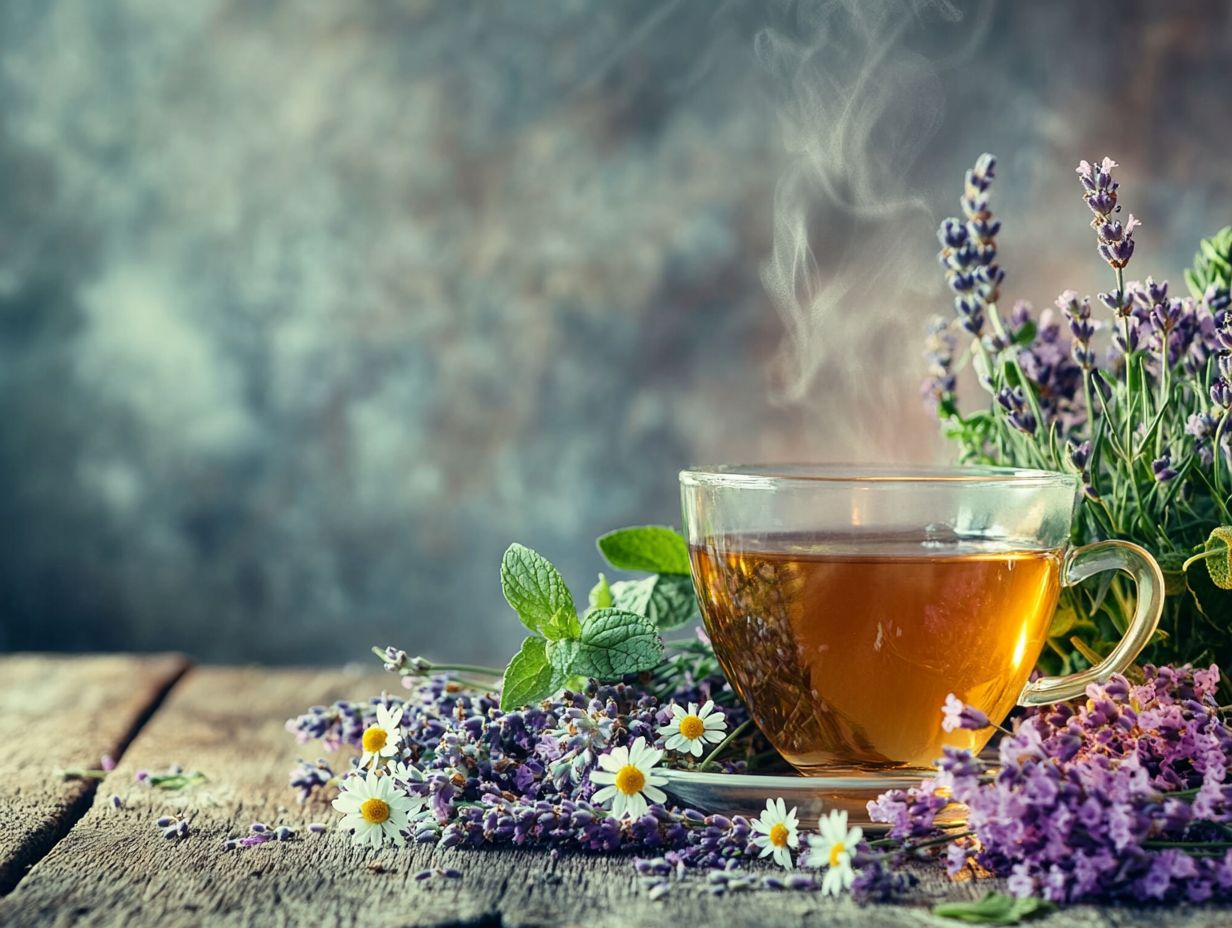
When exploring herbal remedies for anxiety and stress relief, approach the process with caution. Discussing your plans with a mental health professional can help you avoid adverse effects and ensure these remedies fit safely within your treatment plan.
An individualized approach is essential, as the effectiveness and safety of these remedies can vary based on your health history. For instance, some herbs, like St. John’s Wort, may negatively interact with prescription medications, making thorough evaluations by a healthcare provider necessary.
If you have specific conditions like liver issues or severe anxiety disorders, you may need to avoid certain herbs altogether. By considering your health factors and potential interactions, you can confidently explore your options for managing anxiety more effectively.
Other Natural Methods for Stress Relief
In addition to herbal remedies, many natural methods can effectively promote stress relief. Embrace mindfulness practices, explore relaxation techniques, and adopt self-care strategies that enhance your emotional well-being and mental health.
Complementary Practices and Techniques
Practices such as yoga and mindfulness meditation significantly enhance your stress management efforts. They work well with herbal remedies to create a holistic approach to emotional well-being.
Integrating techniques like deep-breathing exercises, progressive muscle relaxation, and regular physical activity can help cultivate a profound sense of calm and resilience against anxiety.
Research shows that engaging in yoga improves flexibility, strength, mental clarity, and emotional balance. Mindfulness meditation fosters present-focused awareness, allowing you to detach from racing thoughts and inner turmoil.
When you incorporate these practices into your daily routine, you create a nurturing environment for your mind and body, empowering yourself to navigate life’s challenges more effectively while maximizing the benefits of herbal treatments.
Frequently Asked Questions
What are some herbs that can help relieve stress and anxiety?
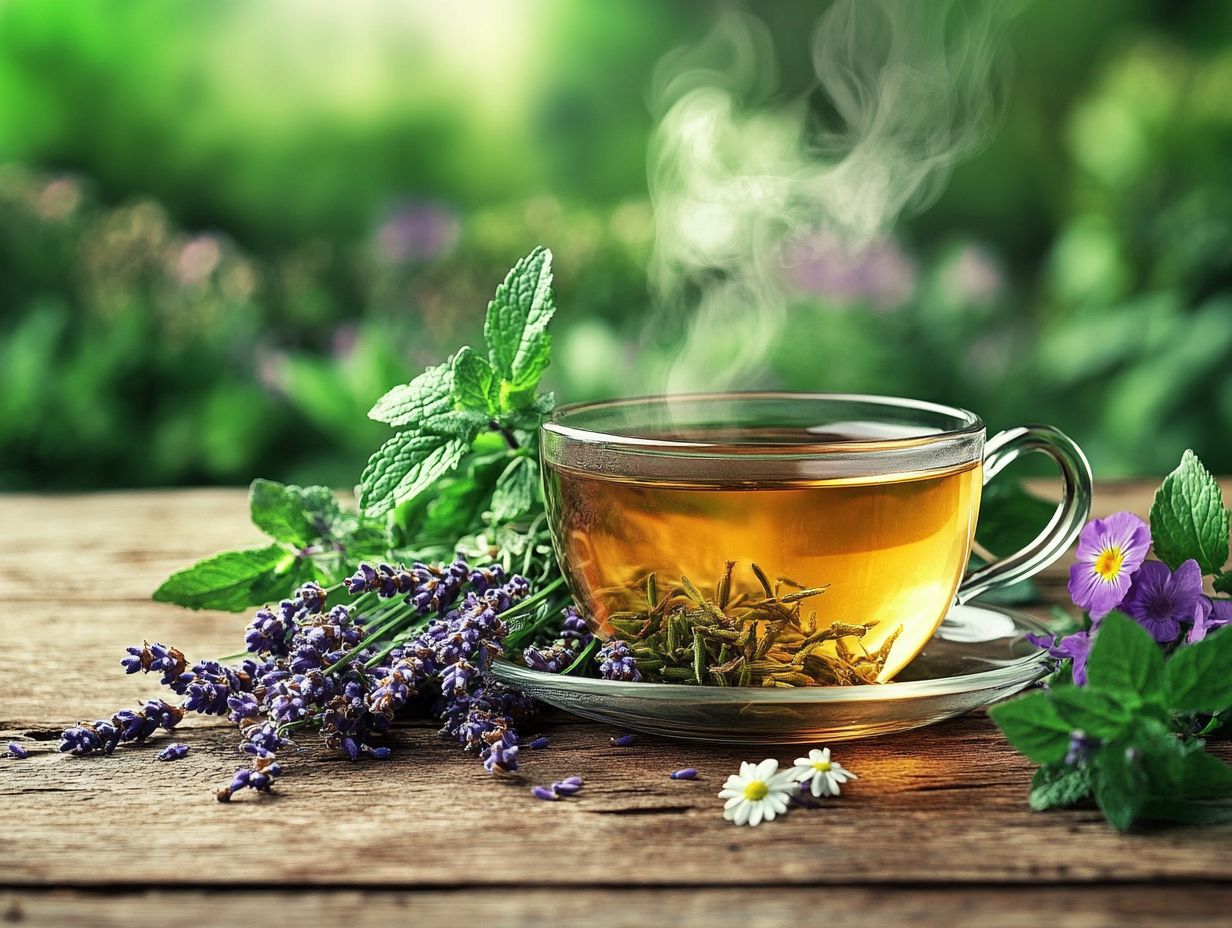
Several herbs can help relieve stress and anxiety. Common examples include ashwagandha, chamomile, passionflower, and lemon balm.
How do these herbs work?
These herbs affect brain chemicals like GABA and serotonin. GABA helps calm the brain, while serotonin is important for mood regulation.
Are there any side effects?
These herbs are generally safe, but some may cause drowsiness or upset stomach. Always check with a healthcare professional before trying a new herbal remedy.
Can herbs be taken with prescription medication?
Consult a healthcare professional before mixing herbs with prescription medications. Some herbs can change how medications work.
What are the recommended dosages?
Dosages may vary based on individual needs. Follow product label instructions or get personalized advice from a healthcare professional.
How long until these herbs work?
Effects can vary greatly among individuals. Some may feel relief quickly, while others might need a few weeks of regular use.

